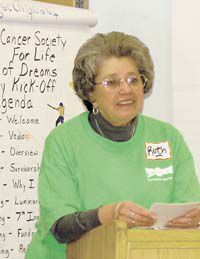| Team recruitment chair Ruth Metzger hosts the Jan. 17 ceremony kicking off local Relay for Life activities. |
On Jan. 17, organizers in Castle Valley kicked off the American Cancer Society’s 2007 Relay for Life activities during a ceremony at Castleview Hospital.
The kickoff, hosted by team recruitment chair Ruth Metzger, was scheduled to target team leaders for early registration.
“We are halfway to our goal of 50 teams for this year’s event. And for that to happen this early in the year just amazes me,” said Metzger.
During the kickoff session, Barbara Piccolo shared her cancer survivor’s story and Metzger outlined the theme for the 2007 event, which is “field of dreams.”
The theme will be highlighted by giving each relay group the name of a professional baseball team.
The event will be presented at the College of Eastern Utah’s Bunnell-Dimitich Athletic Center track on June 15 and June 16.
But according to Metzger, a significant amount of work must be completed before the relay.
The captains for the local relay teams are required to attend four meetings at the hospital classroom.
The team captains’ meetings are scheduled on Feb. 8, March 1, April 5 and June 7.
The captains will also be charged with recruiting between nine and 15 individuals for their teams.
After selecting the members, it is suggested that captains meet with teams and challenge the groups by providing incentives to promote competition as well as set a fundraising goal of at least $1,000.
A team’s money will be dedicated to someone who has or who has had cancer.
Team and individual fundraising events are the largest sources of income for Relay for Life. The activities typically account for around 85 percent of the net income for the event.
Each participant in a relay is asked to raise at least $100 in donations in the months leading up to the event.
The American Cancer Society recommends that participants start recruitment with family and friends.
“Relay is for everyone, and you don’t have to be athletic to participate,” said Metzger.
The captains handbook indicates: “People will be walking, running, strolling, dancing, and wheeling around the track. You may be surprised that some of your friends and co-workers have a connection to cancer and a motivation to get involved that you would never know about until you ask.”
Arranging a presentation at work is also something a team captain may do.
“The majority of current relay participants heard about it through work. A presentation is a good way to give your co-workers the opportunity to get involved,” reported the captains handbook.
Fundraising activities that have been conducted in the past for Castle Valley’s Relay for Life include raffles, bake sales, spaghetti dinners, barbecues and yard sales.
“The Eastern Utah Community Credit Union has a yard sale every year, and I am just amazed by the amount of money they earn,” said Metzger.
All proceeds generated by the Relay for Life Cancer Society. The funds are divided into four key areas in the fight against cancer.
The four key areas include:
•Research, the society is the largest source of non-profit, non-governmental cancer research funding in the United States, investing about $130 million each year. The society has funded 38 researchers that later went on to win the Nobel prize.
•Education, following the societies wellness and cancer detection guidelines can save lives. They publish educational materials and programs on early detection and prevention of cancer for communities, schools, physicians, and patients.
•Advocacy, the society fights for life saving laws to increase federal research funding, reduce tobacco use, promote early detection of cancers, improve access to and coverage of care, and support cancer patients.
•Service, the societies provide many patients and family support services to help people with cancer during and after treatment. Anyone, anywhere can access cancer information and support from the society at www.cancer.org.
Participants in the relay are welcome to camp on the field of the track as the event lasts for 18 hours. “We would like to see at least one member of your team on the track for the entirety of the event,” said Metzger. Restrooms for those camping will be provided by the BDAC.
“I would like to thank everyone that has signed up so far, and encourage anyone who is interested to join us in this wonderful event,” concluded Metzger. Those wishing to participate may contact Ruth Metzger or Michele Gabb at (435) 820-4920.

